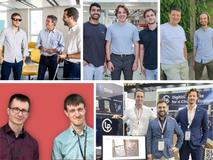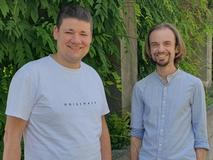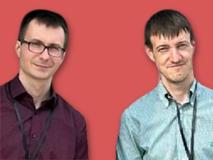Startups developing smart eyewear for vision-impaired people, diagnostic assistant for neonatal sepsis, real-time crop growth monitoring, AI-assisted geroprotectors discovery, and digital innovation for the waste industry
21.12.2023
LighthouseTech, Neosens, Terensis, SYDRA, and UpCircle were selected at Venture Kick's first financial and entrepreneurial support stage. Their projects develop a smart eyewear frame equipped with front-facing sensors that scan the environment and alert the user of hazards located in the path using a soft haptic vibration; a point-of-care diagnostic system; leveraging cutting-edge patented biosensing technology with Artificial Intelligence for early-stage neonatal sepsis diagnosis; develop systematically and on large-scale drugs able to increase health- and lifespan; and make recycling more ecological and economical.
 |
 LighthouseTech: COO Nathan Deutsch, CEO Franco Burlando, and CTO Andrea Moroni Stampa
|
 Neosens: CEO Karim Zahra, COO Mateo Hamel, and CTO Marco Fumagalli
|
 Terensis: CEO Gregor Perich and CTO Lukas Graf
|
 SYDRA: CSO Alexander Dakhovnik, and CTO Pavlo Mozharovsky
|
 UpCircle: from left to right, CEO Hendrik Kolvenbach, CTO Fidel Esquivel, and COO Adrian Ensmenger
|
LighthouseTech: Pioneering smart eyewear for blind and vision-impaired people
Blind and visually impaired people rely on the white cane for walking. While this is the best solution available for detecting obstacles on the ground or low-lying levels, it cannot effectively protect them from collisions above the waist. The fear of collisions affects the choices of low-vision people, resulting in negative societal impacts and costs.
Lighthouse developed a smart eyewear frame equipped with front-facing sensors that scan the environment and alert the user of hazards located in the path using a soft haptic vibration. In combination with the white cane, Lighthouse offers full body protection. It is the only obstacle-detection eyewear in a large and growing market. With over 15m potential users in North America and Europe and 50m worldwide, Lighthouse has a huge growth potential. To back this growth there is a strong and experienced team: Andrea an electronics engineer, Nathan a social scientist, and Franco, Riccardo, and Claudio who are veterans in the optical and eyewear industry with 35+ years of experience.
The Venture Kick Stage 1 funds will be used to develop the software and firmware for our device.
Neosens: Point of care diagnostic assistant for neonatal sepsis
Neonatal Sepsis is a life-threatening medical emergency where immediate antibiotic treatment is key to patient survival. Yet, it’s extremely challenging to diagnose at an early stage as newborns present nonspecific clinical signs and gold-standard diagnostic tests are slow, inaccurate, and expensive. This results in overdiagnosis and prolonged unnecessary antibiotic treatment for approximately 12% of all newborns. Those unnecessary treatments lead to serious adverse effects for newborns, add substantial financial burdens to Neonatal intensive care units (NICUs), and amplify the alarming increase of antibiotic resistance— a Global Health Threat by the WHO.
Neosens, driven by a committed founding team from EPFL and ETH, including CEO Karim Zahra, COO Mateo Hamel, and CTO Marco Fumagalli, combines expertise in Microengineering, Machine Learning, and Life sciences. They are developing a point-of-care diagnostic system, leveraging cutting-edge patented biosensing technology with Artificial Intelligence for early-stage neonatal sepsis diagnosis. This pioneering approach will offer a faster, more accurate, and cost-effective alternative to existing diagnostic methods, effectively addressing a pivotal need in neonatal healthcare. The market potential for Neosens is substantial, with more than 14 million newborns misdiagnosed in NICUs per year. The global sepsis diagnostics market size was valued at USD 685.4 million in 2022 and is expected to grow at a compound annual growth rate (CAGR) of 9.7% from 2023 to 2030. The strategic positioning of Neosens technology lays the foundation for potential expansion into broader healthcare markets, promising significant growth prospects.
The Venture Kick Stage 1 funds will play a pivotal role in accelerating the development and validation of Neosens' groundbreaking technology. They will initiate a pilot project with Ain Shams University Hospital in Egypt, marking crucial progress toward their mission of revolutionizing neonatal sepsis diagnosis globally.
Terensis: Real-time crop growth monitoring and yield estimation
Information flows in agriculture are bilateral, delayed, or do not happen at all. This creates information asymmetries which lead to inefficient resource allocation, resource use, and increased business risk. The crop digital twin of Terensis models agricultural field crops in near real-time by combining satellite imagery and crop models. This enables a near-real-time tracking of crop growth within the growing season and crop yield estimation up to two months before harvest.
Terensis is co-founded by ETH Pioneer Fellows Lukas Graf and Dr. Gregor Perich with a background in agricultural sciences and geo-informatics. Their mission is to provide access to the same information quantity and quality for all stakeholders along the agricultural value chain. With their crop digital twin, Terensis is eager to conquer the world cropland area estimated at 1.6 billion hectares.
Venture Kick funds enable Terensis to expand its team to scale up existing technology as well as sales and after-sales support.
SYDRA: AI-assisted geroprotectors (longevity drugs) discovery.
It has already been illustrated in animals that an organism's health- & lifespan can be increased. The task of SYDRA is to develop systematically and on large-scale drugs able to increase health- and lifespan (called geroprotectors).
Being led by an enthusiastic and highly motivated founders’ team consisting of a biogerontologist Dr. Alex Dakhovnik and an AI specialist Dr. Pavlo Mozharovskyi, SYDRA deploys a feedback-based AI-driven drug-development platform for longevity. More precisely, AI-proposed drugs shall be screened in C. elegans nematodes with a short lifespan and elderly rodents along with toxicity testing and pathway identification. Within the foreseeable timeframe, potentially billions' market can be addressed.
The VK Stage 1 funding shall be used for business development, more precisely for creating a business plan and communicating with potential investors.
UpCircle – Digital Innovation for the Waste Industry
UpCircle, a cleantech startup from ETH Zürich, is at the forefront of transforming the analog recycling industry through the integration of AI and Digital Innovation. The startup aims to eliminate inefficiencies in waste processing deriving from subjective human assessments of material quality.
By implementing a consistent and automated approach to material quality estimation, UpCircle acquires actionable data insights concerning plant feedstock, mitigating human errors and establishing a more ecological and economical processing system. Initial installations within plastics and cardboard recycling companies have shown the need for innovative solutions in this industry.
The co-founding team consists of CEO Dr. Hendrik Kolvenbach, CTO Fidel Esquivel, COO Adrian Ensmenger, and other collaborators with backgrounds in robotics, machine learning, and materials science. This diverse skill set of the team allows UpCircle to address the complexities of waste management and leverage technological advancements for the benefit of the industry.
With the Venture Kick Stage 1 funds, UpCircle intends to accelerate both the business and technological aspects of its enterprise. These funds will be used for further business and solution development, solidifying their position in the $1.3 trillion waste management market.
Blind and visually impaired people rely on the white cane for walking. While this is the best solution available for detecting obstacles on the ground or low-lying levels, it cannot effectively protect them from collisions above the waist. The fear of collisions affects the choices of low-vision people, resulting in negative societal impacts and costs.
Lighthouse developed a smart eyewear frame equipped with front-facing sensors that scan the environment and alert the user of hazards located in the path using a soft haptic vibration. In combination with the white cane, Lighthouse offers full body protection. It is the only obstacle-detection eyewear in a large and growing market. With over 15m potential users in North America and Europe and 50m worldwide, Lighthouse has a huge growth potential. To back this growth there is a strong and experienced team: Andrea an electronics engineer, Nathan a social scientist, and Franco, Riccardo, and Claudio who are veterans in the optical and eyewear industry with 35+ years of experience.
The Venture Kick Stage 1 funds will be used to develop the software and firmware for our device.
Neosens: Point of care diagnostic assistant for neonatal sepsis
Neonatal Sepsis is a life-threatening medical emergency where immediate antibiotic treatment is key to patient survival. Yet, it’s extremely challenging to diagnose at an early stage as newborns present nonspecific clinical signs and gold-standard diagnostic tests are slow, inaccurate, and expensive. This results in overdiagnosis and prolonged unnecessary antibiotic treatment for approximately 12% of all newborns. Those unnecessary treatments lead to serious adverse effects for newborns, add substantial financial burdens to Neonatal intensive care units (NICUs), and amplify the alarming increase of antibiotic resistance— a Global Health Threat by the WHO.
Neosens, driven by a committed founding team from EPFL and ETH, including CEO Karim Zahra, COO Mateo Hamel, and CTO Marco Fumagalli, combines expertise in Microengineering, Machine Learning, and Life sciences. They are developing a point-of-care diagnostic system, leveraging cutting-edge patented biosensing technology with Artificial Intelligence for early-stage neonatal sepsis diagnosis. This pioneering approach will offer a faster, more accurate, and cost-effective alternative to existing diagnostic methods, effectively addressing a pivotal need in neonatal healthcare. The market potential for Neosens is substantial, with more than 14 million newborns misdiagnosed in NICUs per year. The global sepsis diagnostics market size was valued at USD 685.4 million in 2022 and is expected to grow at a compound annual growth rate (CAGR) of 9.7% from 2023 to 2030. The strategic positioning of Neosens technology lays the foundation for potential expansion into broader healthcare markets, promising significant growth prospects.
The Venture Kick Stage 1 funds will play a pivotal role in accelerating the development and validation of Neosens' groundbreaking technology. They will initiate a pilot project with Ain Shams University Hospital in Egypt, marking crucial progress toward their mission of revolutionizing neonatal sepsis diagnosis globally.
Terensis: Real-time crop growth monitoring and yield estimation
Information flows in agriculture are bilateral, delayed, or do not happen at all. This creates information asymmetries which lead to inefficient resource allocation, resource use, and increased business risk. The crop digital twin of Terensis models agricultural field crops in near real-time by combining satellite imagery and crop models. This enables a near-real-time tracking of crop growth within the growing season and crop yield estimation up to two months before harvest.
Terensis is co-founded by ETH Pioneer Fellows Lukas Graf and Dr. Gregor Perich with a background in agricultural sciences and geo-informatics. Their mission is to provide access to the same information quantity and quality for all stakeholders along the agricultural value chain. With their crop digital twin, Terensis is eager to conquer the world cropland area estimated at 1.6 billion hectares.
Venture Kick funds enable Terensis to expand its team to scale up existing technology as well as sales and after-sales support.
SYDRA: AI-assisted geroprotectors (longevity drugs) discovery.
It has already been illustrated in animals that an organism's health- & lifespan can be increased. The task of SYDRA is to develop systematically and on large-scale drugs able to increase health- and lifespan (called geroprotectors).
Being led by an enthusiastic and highly motivated founders’ team consisting of a biogerontologist Dr. Alex Dakhovnik and an AI specialist Dr. Pavlo Mozharovskyi, SYDRA deploys a feedback-based AI-driven drug-development platform for longevity. More precisely, AI-proposed drugs shall be screened in C. elegans nematodes with a short lifespan and elderly rodents along with toxicity testing and pathway identification. Within the foreseeable timeframe, potentially billions' market can be addressed.
The VK Stage 1 funding shall be used for business development, more precisely for creating a business plan and communicating with potential investors.
UpCircle – Digital Innovation for the Waste Industry
UpCircle, a cleantech startup from ETH Zürich, is at the forefront of transforming the analog recycling industry through the integration of AI and Digital Innovation. The startup aims to eliminate inefficiencies in waste processing deriving from subjective human assessments of material quality.
By implementing a consistent and automated approach to material quality estimation, UpCircle acquires actionable data insights concerning plant feedstock, mitigating human errors and establishing a more ecological and economical processing system. Initial installations within plastics and cardboard recycling companies have shown the need for innovative solutions in this industry.
The co-founding team consists of CEO Dr. Hendrik Kolvenbach, CTO Fidel Esquivel, COO Adrian Ensmenger, and other collaborators with backgrounds in robotics, machine learning, and materials science. This diverse skill set of the team allows UpCircle to address the complexities of waste management and leverage technological advancements for the benefit of the industry.
With the Venture Kick Stage 1 funds, UpCircle intends to accelerate both the business and technological aspects of its enterprise. These funds will be used for further business and solution development, solidifying their position in the $1.3 trillion waste management market.


